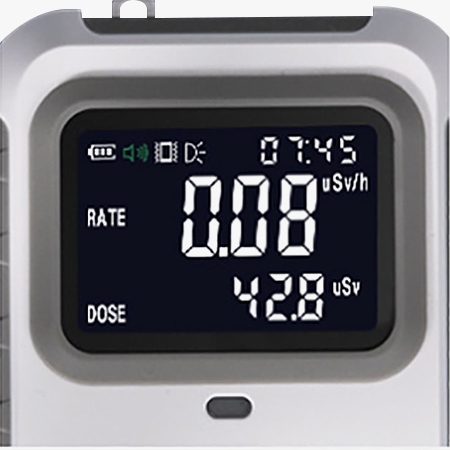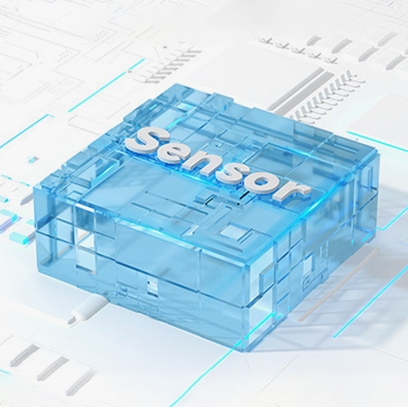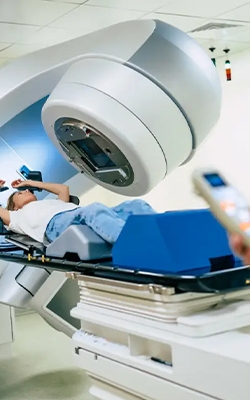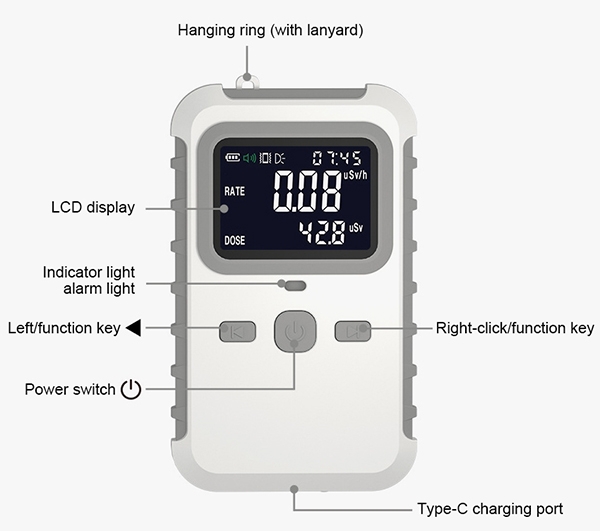SISCO handheld radiation detector with power-off memory function, even if there is a sudden power failure with the counter, the parameters you set before will not disappear, including the cumulative dose rate and 12 groups of alarm data. The portable radiation detector is widely applied in geological surveys, home improvement radiation, nuclear power plants, industry, radiology, radiology laboratories and so on.

Large display for more precise readings
- The nuclear radiation detector features a generously sized screen, making it easier to view and interpret radiation levels even in low-light or high-stress environments. This improves user experience, especially in emergency situations.
- The larger display allows for more precise readings by showing data clearly and in greater detail, minimizing the risk of misinterpretation and ensuring accurate monitoring of radiation levels.
- With the increased screen size, the detector can display multiple radiation metrics simultaneously, such as dose rate, cumulative exposure, and average readings, providing a comprehensive overview in real-time.

The radiation meter is equipped with a scintillator sensor
- The detector utilizes advanced scintillation sensor technology to detect ionizing radiation with high sensitivity and accuracy. This allows for rapid identification of radiation levels, even at low intensities.
- Scintillation sensors are known for their quick response to radiation, enabling real-time monitoring that is crucial in nuclear fallout scenarios where rapid changes in radiation levels may occur.
- The use of scintillation sensors improves the detection range of the device, allowing it to measure different types of radiation, including alpha, beta, and gamma rays, with greater efficiency and precision.
Applications
SISCO radiation detector is a device used to detect and measure ionizing radiation, such as alpha, beta, gamma rays, and neutrons. Radiation detectors are used in medical imaging, industrial safety, environmental monitoring, and security to measure ionizing radiation. They help ensure safe radiation levels, detect contamination, and prevent the unauthorized transport of radioactive materials. They’re also crucial in scientific research for studying radiation effects.

Environmental

Security

Industrial

Medical
| Model | SISCO-RD-BRS02 |
| Detector | Scintillator |
| Scintillator Probe | φ8mm*15mm |
| Detectable Types | β, γ, X-ray |
| Display Unit | μSv/h, mSv/h, CPM |
| Data Storage | 12 groups |
| Radiation Dose Rate Range | 0.01 μSv/h-50 mSv/h |
| Radiation Dose Cumulative Range | 0-9999 mSv/h |
| Test Accuracy | 0.01 μSv/h, 0.01 mSv/h |
| Sensitivity | ≥2.2cps/μSv/h (relative to 137Cs) |
| Alarm Threshold | 0-50000 μSv/h, adjustable in sections |
| Alarm Mode | Any combination of sound, light and vibration alarm |
| Measurement Time | Real-time measurement/automatic |
| Protection Alarm Time | 1-3s |
| Waterproof Level | IPX4 |
| Operating temperature | -20℃-40℃ |
| Operating Humidity | 0-95% |
| Weight | 80g |
Detail

Q1: What is a radiation detector?
A1: A radiation detector is a device designed to detect and measure ionizing radiation, such as alpha, beta, gamma rays, and neutrons. These detectors work by sensing the interaction of radiation with matter, often producing an electrical signal that correlates with the intensity or type of radiation present. Radiation detectors come in various types, including Geiger-Müller counters, scintillation detectors, and solid-state detectors, each tailored to detect different forms of radiation or provide varying levels of sensitivity.
Q2: Do radiation detectors need calibration?
A2: Yes, radiation detectors need regular calibration to ensure accurate and reliable measurements. Calibration involves adjusting the detector to account for any changes in its performance over time, which can be caused by factors such as aging components, environmental conditions, or variations in detector sensitivity. Regular calibration helps maintain the accuracy of the readings and ensures that the detector provides precise data for assessing radiation levels. Calibration is typically performed using known radiation sources and may be required by regulatory standards to ensure compliance and safety.
Q3: Can radiation detectors detect non-ionizing radiation?
A3: Most radiation detectors are designed to detect ionizing radiation, such as alpha, beta, gamma rays, and neutrons. Non-ionizing radiation, which includes radio waves, microwaves, infrared, and visible light, requires different types of sensors. For example:
- Radio frequency (RF) meters and electromagnetic field (EMF) meters are used to measure non-ionizing radiation like radio waves and microwaves.
- Photodetectors (such as photodiodes) measure visible light, while infrared sensors detect infrared radiation.
Tips: How can a radiation detector help in a nuclear fallout situation?
In a nuclear fallout situation, a radiation detector helps by:
- Assessing Radiation Levels: Provides crucial information on the intensity of radiation in the environment.
- Guiding Safety Measures: Helps determine when it is safe to leave a shelter or take protective actions.
- Supporting Emergency Response: Assists authorities in making informed decisions about public safety and evacuation.
Thank you for buying industrial test and measurement equipment on SISCO.com, all products sold by SISCO and the partner cover a 12 months warranty, effective from the date of receiving the products.
What is covered?
SISCO is responsible for providing free spare parts, and free technical support to assist the customer to repair the defective products until the problem is solved.
What is not covered?
- Product purchased from anyone other than a SISCO store or a SISCO authorized reseller.
- Expendable parts.
- Routine cleaning or normal cosmetic and mechanical wear.
- Damage from misuse, abuse or neglect.
- Damage from use of parts other than SISCO approved.
- Damage from use outside the product’s usage or storage parameters.
- Damage from use of parts not sold by SISCO.
- Damage from modification or incorporation into other products.
- Damage from repair or replacement of warranted parts by a service provider other than a SISCO authorized service provider.
- Damage caused by the application environment not meeting the product usage requirements and the failure to perform preventive maintenance.

